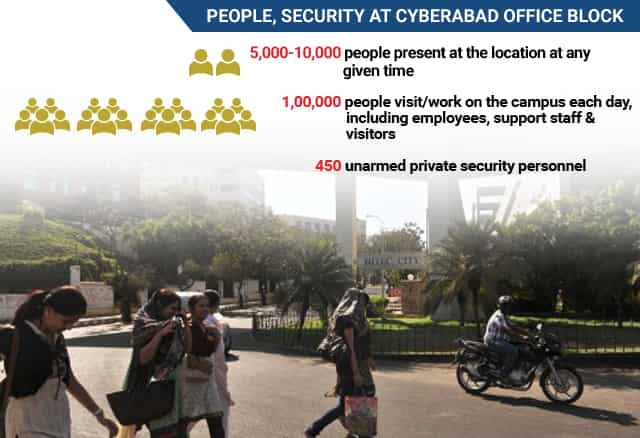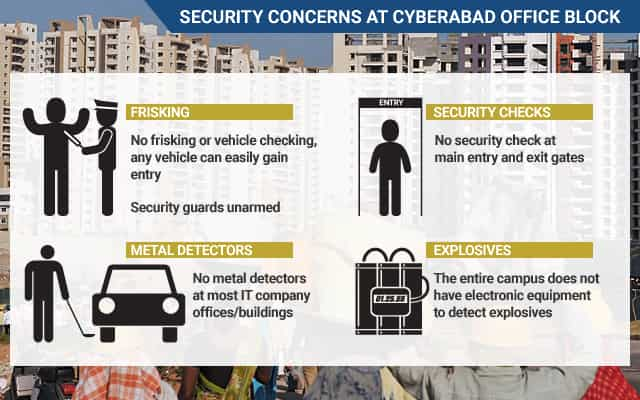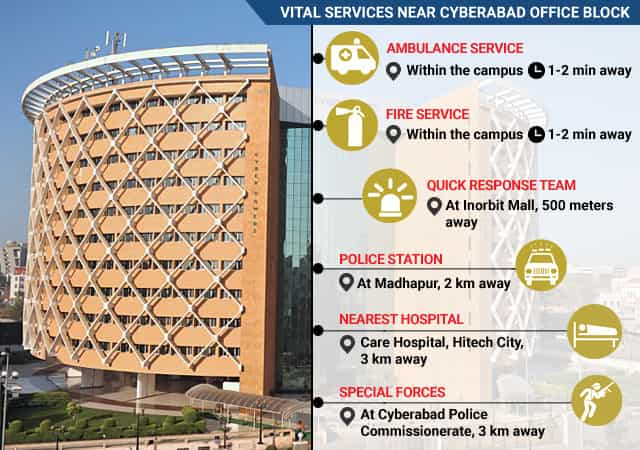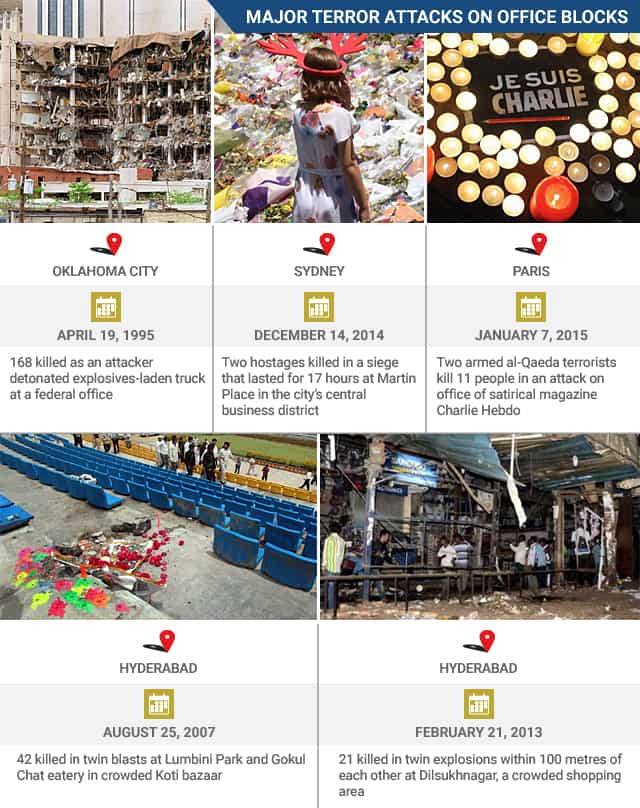Cyberabad IT Park’s guards can’t hold off terrorists for even 3 mins: Expert
Unarmed guards man the sprawling Hyderabad cybercity, which houses 190 software companies. “They can’t hold off the terrorists even for 3 minutes,” warns expert.

The revelation of plans to carry out a Brussels-type attack in densely-populated areas of Hyderabad by an IS module has exposed chinks in the security apparatus in the city, especially at the IT Corridor.
Five IS operatives, arrested by NIA on June 29, had disclosed their plans to carry out an attack in areas like Bhagyalakshmi temple near Charminar in the old city and the IT Corridor at Madhapur in Cyberabad.
With IT exports touching Rs 75,000 crore annually, Hyderabad, a software hub, has become an obvious target as it can grab worldwide attention immediately. However, a check at Raheja Mindspace IT Park at Cyberabad, which houses 135 software companies, exposed some glaring loopholes in the security setup.
The 109-acre IT SEZ has state-of-the-art electronic surveillance system with over 150 high-definition CCTV cameras being monitored by a team of experts at a command and control centre in the main building of the Raheja corporate office.
Click here to read all the stories in this series so far

But the “most glaring security lapse” is at the main entrance where “there is no physical check of vehicles or frisking of people. It provides easy access to terrorists,” observed Dr Ramesh Babu Kanneganti, director of Centre for Human Security Studies, who accompanied this correspondent to the IT Park for the check.
Security officials at the campus told HT that every person and vehicle is watched closely through CCTV. “If we get the slightest suspicion, we alert our security people who in turn inform the Cyberabad police,” chief security officer of Raheja Mindspace, Moses Sudhakar said.
He, however, said it was not possible to physically check around one lakh people and 40,000 vehicles entering the software park.
The second tier of security is at each building, where visitors are allowed inside only after they register themselves and are given a pass. However, there are no metal detectors or physical checking of people.
Read | Chinks in the security armour of this popular Shia mosque in Lucknow

“What is shocking is that none of the security guards are armed. What will happen if heavily-armed terrorists make a surprise attack?” asked Kanneganti, who has done a post-doctoral study on counter-terrorism in Israel.
Moses argued that the 450-odd personnel are capable of holding terrorists for some time before police responded, but admitted that they were not trained to face major terror attacks.
Kanneganti said the entire campus did not have electronic equipment to detect explosives. He also highlighted the lack of coordination between personnel of different buildings. “There is no mobile security staff alerting companies in case of an emergency.”
When contacted, Cyberabad police commissioner Naveen Chand told HT that they had quick response teams that could respond to situations within minutes.
“We have Octopus forces with specially trained commandos. The QRTs are positioned at key locations. We also have Rapid Action Forces to meet any eventuality,” he said, but refused to divulge details citing the need for secrecy.
Moses said there is one QRT at Inorbit Mall, adjacent to Raheja IT park. “The response time is three and a half minutes,” he said.
But Kanneganti asked, “How can they hold the terrorists even for three minutes with bare hands? This small time is enough for the terrorists to kill a large number of people or blast buildings.”
The Cyberabad police had some time back proposed providing arms licences to corporates in the IT corridor with two guns to each company so that their security personnel can hold terrorists for some time, but the proposal has not seen the light of the day.
“We are examining it,” Chand said.
Read | Red alert: Why alarm bells should be ringing at Mumbai airport

The 190-odd software companies in Cyberabad, including those in Raheja Mindspace, had formed a Cyberabad Security Council in 2006 in coordination with police, primarily to ensure security to IT employees. After the 26/11 Mumbai attacks, the scope of the council was expanded to terror attacks.
The measures taken include installation of electronic surveillance systems with 24x7 monitoring mechanism and deployment of bomb disposal squads and dog squads.
“We have laid highly sophisticated fibre optic network all over Cyberabad connected to surveillance cameras which are 98% operational,” said Vemuru Srinivasa Prasad, founder and former secretary of Cyberabad Security Council.
He however said that this will serve only 30% of the security and the rest would have to be done by police. “After all, what can we do if some terrorists attack the IT park from a hotel across the road using rocket launcher?” he asked.






